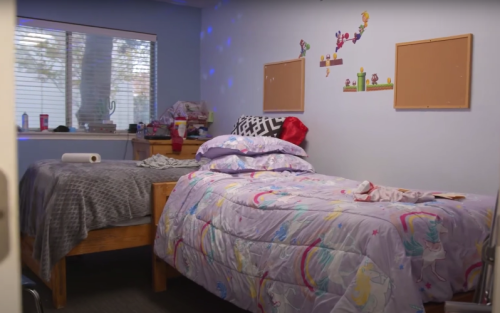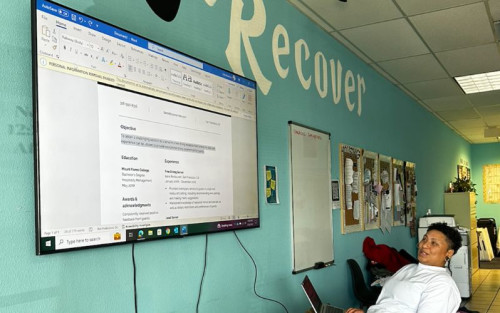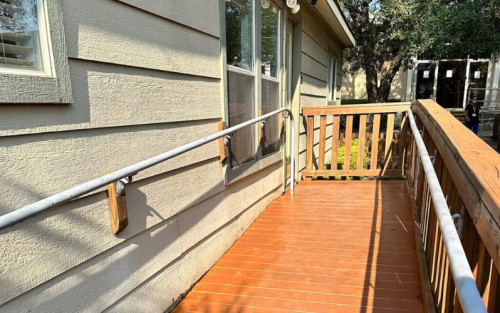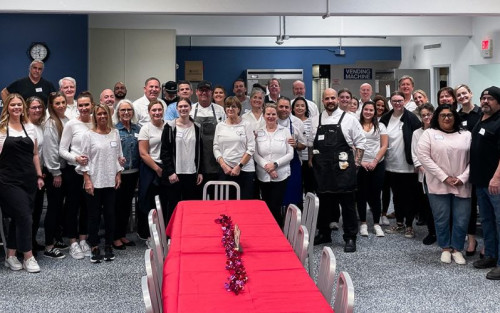






Nexus Recovery Center
Treatment Focus
This center treats substance use disorders and co-occurring mental health conditions. Your treatment plan addresses each condition at once with personalized, compassionate care for comprehensive healing.
Primary Level of Care
Offering intensive care with 24/7 monitoring, residential treatment is typically 30 days and can cover multiple levels of care. Length can range from 14 to 90 days typically.
This provider hasn't verified their profile's information. Are you the owner of this center? Claim your listing to better manage your presence on Recovery.com.
Treatment Focus
This center treats substance use disorders and co-occurring mental health conditions. Your treatment plan addresses each condition at once with personalized, compassionate care for comprehensive healing.
Primary Level of Care
Offering intensive care with 24/7 monitoring, residential treatment is typically 30 days and can cover multiple levels of care. Length can range from 14 to 90 days typically.
Provider's Policy
We accept these insurance providers. If you do not have insurance, we want to help, regardless of your ability to pay.
Nexus Recovery Center
Nexus Recovery Center
About Nexus Recovery Center
Located in Dallas, Texas, Nexus Recovery Center provides residential treatment for drug and alcohol addiction, as well as co-occurring mental health disorders. They allow clients to bring cigarettes onsite. Nexus' program begins with 5 to 7 days of medical detox, and then clients stay as long as needed. Nexus' program uses evidence-based treatments like cognitive behavioral therapy (CBT) and medication-assisted treatment (MAT), which uses naloxone (Narcan). Clients can call family members using a Nexus-owned cell phone. Clients participate in individual and group discussions, and Nexus finds groups based on similar experiences, such as which clients have kids and which clients have experienced similar traumatic life events. When clients finish residential treatment and have stable housing, Nexus Recovery Center prepares their discharge plan, which can include intensive outpatient (IOP) treatment at Nexus.
To facilitate recovery, the campus contains a serenity garden and the staff organize kid-friendly adventure outings to places like the Dallas Zoo, the Dallas Arboretum, White Rock Lake, indoor skydiving, and coffeeshop visits. Nexus is currently renovating its campus.
Clientele
Nexus Recovery Center serves adult women, regardless of whether they have kids, and adolescents 13-17 who are pregnant or have kids. Moms can bring up to 3 kids ages 0-12, and they can deliver babies onsite. Pregnant women and mothers receive parental education and postpartum support.
Nexus accepts Medicaid, BlueCross Blue Shield of Texas, Carelon, Cenpatico, Children's Community Health Plan, Cigna, CompCare, Magellan Behavioral Health, Molina Healthcare, Parkland Community Health Plan, Scott & White Health Plan, Texas Bluebonnet, Texas True Choice, and Wellpoint. As a non-profit, they work with clients who don't have insurance.
Aftercare
Nexus Recovery Center has peer specialists available to take calls. Many of their specialists are former clients. Nexus welcomes return clients.

Center Overview
Treatment Focus
This center treats substance use disorders and co-occurring mental health conditions. Your treatment plan addresses each condition at once with personalized, compassionate care for comprehensive healing.
Joint Commission Accredited
The Joint Commission accreditation is a voluntary, objective process that evaluates and accredits healthcare organizations (like treatment centers) based on performance standards designed to improve quality and safety for patients. To be accredited means the treatment center has been found to meet the Commission's standards for quality and safety in patient care.

Insurance Accepted
Cash Pay Rates
Estimated Cash Pay Rate
Center pricing can vary based on program and length of stay. Contact the center for more information. Recovery.com strives for price transparency so you can make an informed decision.
Levels of Care







Your Care Options
Specializations
Alcohol
Using alcohol as a coping mechanism, or drinking excessively throughout the week, signals an alcohol use disorder.
Drug Addiction
Drug addiction is the excessive and repetitive use of substances, despite harmful consequences to a person's life, health, and relationships.
Pregnant Women
Addiction and mental health treatment meets the clinical and psychological needs of pregnant women, ensuring they receive optimal care in all areas.
Who We Treat
Adolescents
Teens receive the treatment they need for mental health disorders and addiction, with the added support of educational and vocational services.
Pregnant Women
Addiction and mental health treatment meets the clinical and psychological needs of pregnant women, ensuring they receive optimal care in all areas.
Women only
Women attend treatment in a gender-specific facility, with treatment delivered in a safe, nourishing, and supportive environment for greater comfort.
Approaches
Individual Treatment
Individual care meets the needs of each patient, using personalized treatment to provide them the most relevant care and greatest chance of success.
Twelve Step
Incorporating spirituality, community, and responsibility, 12-Step philosophies prioritize the guidance of a Higher Power and a continuation of 12-Step practices.
Gender-Specific
Separate treatment for men or women can create strong peer connections and remove barriers related to trauma, shame, and gender-specific nuances.
Therapies
1-on-1 Counseling
Patient and therapist meet 1-on-1 to work through difficult emotions and behavioral challenges in a personal, private setting.
Trauma-Specific Therapy
This form of talk therapy addresses any childhood trauma at the root of a patient's current diagnosis.
Family Therapy
Family therapy addresses group dynamics within a family system, with a focus on improving communication and interrupting unhealthy relationship patterns.
Life Skills
Teaching life skills like cooking, cleaning, clear communication, and even basic math provides a strong foundation for continued recovery.
Medication-Assisted Treatment
Combined with behavioral therapy, prescribed medications can enhance treatment by relieving withdrawal symptoms and focus patients on their recovery.
Motivational Interviewing
Based on the idea that motivation to change comes from within, providers use a conversational framework to discover personalized methods for change.
Relapse Prevention Counseling
Relapse prevention counselors teach patients to recognize the signs of relapse and reduce their risk.
Twelve Step Facilitation
12-Step groups offer a framework for addiction recovery. Members commit to a higher power, recognize their issues, and support each other in the healing process.
Conditions We Treat
Anger
Although anger itself isn't a disorder, it can get out of hand. If this feeling interferes with your relationships and daily functioning, treatment can help.
Trauma
Some traumatic events are so disturbing that they cause long-term mental health problems. Those ongoing issues can also be referred to as "trauma."
Substances We Treat
Alcohol
Using alcohol as a coping mechanism, or drinking excessively throughout the week, signals an alcohol use disorder.
Benzodiazepines
Benzodiazepines are prescribed to treat anxiety and sleep issues. They are highly habit forming, and their abuse can cause mood changes and poor judgement.
Co-Occurring Disorders
A person with multiple mental health diagnoses, such as addiction and depression, has co-occurring disorders also called dual diagnosis.
Drug Addiction
Drug addiction is the excessive and repetitive use of substances, despite harmful consequences to a person's life, health, and relationships.
Methamphetamine
Methamphetamine, or meth, increases energy, agitation, and paranoia. Long-term use can result in severe physical and mental health issues.
Opioids
Opioids produce pain-relief and euphoria, which can lead to addiction. This class of drugs includes prescribed medication and the illegal drug heroin.
Languages
Aftercare
Intensive Outpatient Program
In an IOP, patients live at home or a sober living, but attend treatment typically 9-15 hours a week. Most programs include talk therapy, support groups, and other methods.
Care Designed for Your Needs
Personal Amenities
Amenities
Special Considerations
Family Member Stays
Treatment providers welcome family members to stay on-site to better the experience and success of patients and their families as a whole.
Activities
Smoking and Vaping Policy

What people are saying
Treatment
3.9
Accommodations
3.6
Food & Nutrition
3.9
Value
3.8
Cassie
Reviewed 09/23/22
Review from Rehabs.com
Anonymous
Reviewed 04/06/16
Review from Rehabs.com
Cynthia
Reviewed 09/25/15
Review from Rehabs.com
Anonymous
Reviewed 09/25/15
Review from Rehabs.com
Anonymous
Reviewed 09/25/15
Review from Rehabs.com





